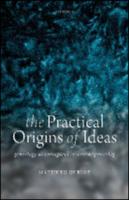The Practical Origins of Ideas
Genealogy as Conceptual Reverse-Engineering
| dc.contributor.author | Queloz, Matthieu | |
| dc.date.accessioned | 2021-04-28T10:02:37Z | |
| dc.date.available | 2021-04-28T10:02:37Z | |
| dc.date.issued | 2021 | |
| dc.identifier | OCN: 1247122789 | |
| dc.identifier.uri | https://library.oapen.org/handle/20.500.12657/48447 | |
| dc.description.abstract | Why did such highly abstract ideas as truth, knowledge, or justice become so important to us? What was the point of coming to think in these terms? In The Practical Origins of Ideas, Matthieu Queloz presents a philosophical method designed to answer such questions: the method of pragmatic genealogy. Pragmatic genealogies are partly fictional, partly historical narratives exploring what might have driven us to develop certain ideas in order to discover what these do for us. The book uncovers an under-appreciated tradition of pragmatic genealogy which cuts across the analytic–continental divide, running from the state-of-nature stories of David Hume and the early genealogies of Friedrich Nietzsche to recent work in analytic philosophy by Edward Craig, Bernard Williams, and Miranda Fricker. However, these genealogies combine fictionalizing and historicizing in ways that even philosophers sympathetic to the use of state-of-nature fictions or real history have found puzzling. To make sense of why both fictionalizing and historicizing are called for, the book offers a systematic account of pragmatic genealogies as dynamic models serving to reverse-engineer the points of ideas in relation not only to near-universal human needs, but also to socio-historically situated needs. This allows the method to offer us explanation without reduction and to help us understand what led our ideas to shed the traces of their practical origins. Far from being normatively inert, moreover, pragmatic genealogy can affect the space of reasons, guiding attempts to improve our conceptual repertoire by helping us determine whether and when our ideas are worth having. | en_US |
| dc.language | English | en_US |
| dc.subject.classification | thema EDItEUR::Q Philosophy and Religion::QD Philosophy::QDT Topics in philosophy::QDTK Philosophy: epistemology and theory of knowledge | en_US |
| dc.subject.classification | thema EDItEUR::Q Philosophy and Religion::QD Philosophy::QDT Topics in philosophy::QDTM Philosophy of mind | en_US |
| dc.subject.classification | thema EDItEUR::Q Philosophy and Religion::QD Philosophy | en_US |
| dc.subject.other | concepts, genealogy, pragmatism, state of nature, history, David Hume, Friedrich Nietzsche, Edward Craig, Bernard Williams, Miranda Fricker | en_US |
| dc.title | The Practical Origins of Ideas | en_US |
| dc.title.alternative | Genealogy as Conceptual Reverse-Engineering | en_US |
| dc.type | book | |
| oapen.identifier.doi | 10.1093/oso/9780198868705.001.0001 | en_US |
| oapen.relation.isPublishedBy | b9501915-cdee-4f2a-8030-9c0b187854b2 | en_US |
| oapen.relation.isFundedBy | 07f61e34-5b96-49f0-9860-c87dd8228f26 | * |
| oapen.relation.isbn | 9780198868705 | |
| oapen.collection | Swiss National Science Foundation (SNF) | |
| oapen.pages | 304 | en_US |
| oapen.place.publication | Oxford | en_US |
| oapen.grant.number | 10BP12_195995 | |
| oapen.grant.program | Open Access Books | |
| oapen.grant.project | The Practical Origins of Ideas: Genealogy as Conceptual Reverse-Engineering | |
| oapen.remark.public | Funder name: The Vaughan Williams Charitable Trust |

